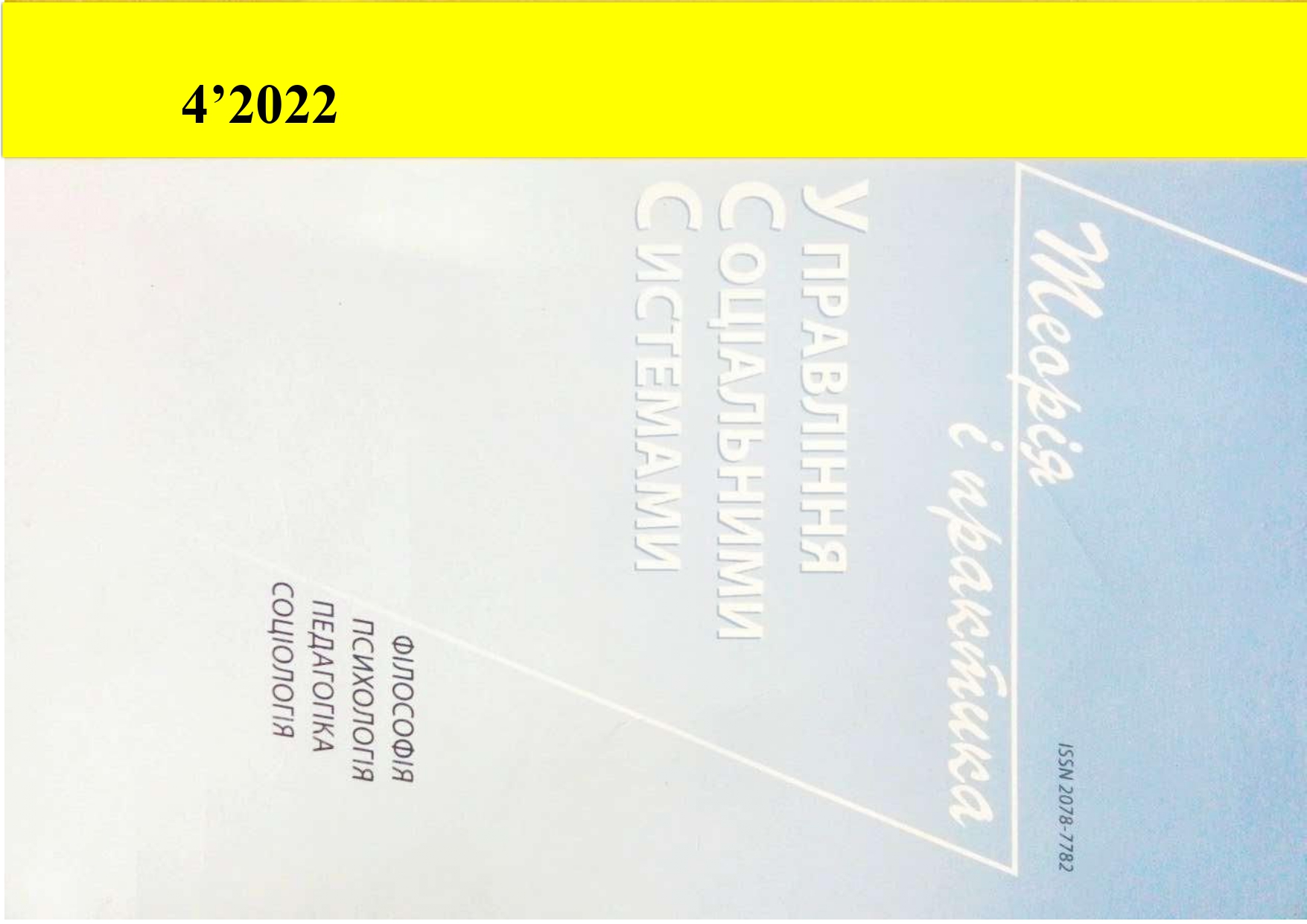ПРОБЛЕМНО-ОРІЄНТОВАНЕ НАВЧАННЯ ТА ЙОГО РОЛЬ У ПРОЦЕСІ ПІДГОТОВКИ МАЙБУТНІХ ЛІДЕРІВ-ПРОФЕСІОНАЛІВ У ТЕХНІЧНИХ УНІВЕРСИТЕТАХ УКРАЇНИ
DOI:
https://doi.org/10.20998/2078-7782.2022.4.01Ключові слова:
лідер, проблемно-орієтоване навчання, фахівець, інноваційні технології, спеціальність, якість підготовкиАнотація
Анотація: статтю присвячено проблемі підготовки майбутніх лідерів-професіоналів різних спеціальностей як організаторів науково-технічного й соціального відродження України. У ході дослідження встановлено, що організацію підготовки таких лідерів доцільно здійснювати в закладах вищої освіти інженерного профілю, що є особливо важливим в умовах агресії Росії проти України. Аналіз літературних джерел довів, що ключові проблеми сучасного соціального прогресу пов'язані з лідерством, конкурентними стратегіями, творчим підходом до викладання у вищій освіті з використанням інноваційних технологій навчання. Проведено експеримент зі застосування технології проблемно-орієнтованого навчання в процесі підготовки майбутніх фахівців-лідерів в Національному технічному університеті “Харківський політехнічний інститут”. У статті представлено низку чинників, які зумовлюють доцільність використання різних форм проблемно-орієнтованого навчання у комплексі з іншими інтерактивними технологіями, щодо вирішення проблеми підвищення якості підготовки лідерів-фахівців різних спеціальностей.
Посилання
Ambler, G. (2005), “Understanding leadership in context”, available at: www.thepracticeofleadership.net/2005/12/08/understanding-leadership-context/. Accessed on April 15, 2010
Bass, B. M., Riggio, R. E. (2006), “Transformational leadership”, 2nd ed., N.Y.: Lawrence Erlbaum Associates Publishers, p. 282
Bleiklie, I., Kogan, M. (2007), “Organization and governance of universities”, Higher Education Policy, 20(4), pp. 477 – 493
Vermillion, S., Malak, R., Smallman, R. (2015), “Study on Outcome Framing and Risk Attitude in Engineering Decisions Under Uncertainty”, Journal of Mechanical Design, vol. 137, issue 8
Whitchurch, C. (2007), “The changing roles and identities of professional managers in UKhigher education”, Perspectives: Policy and Practice in Higher Education, 11(2), pp. 53 – 60
Zinner, L. (2019), “Fostering academic citizenship with a shared leadership approach. In University governance and academic leadership in the EU and China, IGI Global, pp. 99 – 117
Casse, P., Claudel, P. (2007), “Philosophy for Creative Leadership: How philosophy can turn people into more effective leaders”, [S.p.]: Athena Press, p. 280
Conger, J. , Canungo, R. (1994), “Charismatic leadership in organizations: Perceived behavioral attributes and their measurement”, Journal of Organizational Behavior, no. 15, pp. 439 – 452
Kotter, J. (1995), “Leading change: Why transformation efforts fail”, Harvard Business Review, 73, 59 – 67
Merrill, M. David (2002), “A Pebble-in-the-Pond Model for Instructional Design”, Performance Improvement, 41(7), pp. 41 – 46, available at: doi:10.1002/pfi.4140410709
Mojisola Anjorin, Christoph Rensing, Kerstin Bischoff, Christian Bogner, Lasse Lehmann, Anna Lenka Reger, Nils Faltin, Achim Steinacker, Andy Lüdemann, Renato Domínguez García: CROKODIL – a Platform for Collaborative Resource-Based Learning. In: Carlos Delgado Kloos, Denis Gillet, Raquel M. Crespo Garcia, Fridolin Wild, Martin Wolpers: Towards Ubiquitious Learning, Proceedings of the 6th European Conference on Technology Enhanced Learning, EC-TEL 2011, no. LNCS 6964, Springer, September 2011, pp. 29 – 42
Romanovsky, O. , Ponomarev, O. (2017), “Paradoxes of charismatic leadership”, Theory and practice of social systems management, no. 1. pp. 47 – 56
Sadeghi, A., Mostafavi Rad, F. (2018), “The role of knowledge-oriented leadership in knowledge management and innovation”, Management Science Letters, pp. 151 – 160, available at: doi: 10.5267/j.msl.2018.1.003
Sokol, E. I. (2017), “Training of professional leaders as a task of higher school”, Leader. Elite. Society, no. 1, pp. 16 – 22
“Strategy for the development of higher education in Ukraine for 2021–2031” (2020), available at: https://mon.gov.ua/storage/app/media/rizne/2020/09/25/rozvitku-vishchoi-osviti-v-ukraini-02-10-2020.pdf
Tovazhnyansky, L., Romanovsky, O. , Ponomarev, O. (2004), “The concept of formation of the humanitarian and technical elite in NTU “KhPI” and ways of its implementation”, Kharkiv: NTU “KhPI”, p. 416
Ferlie, E., Musselin, C., Andresani, G. (2008), “The steering of higher education systems: A public management perspective”, Higher Education, 56(3), pp. 325 – 348
Hannafin, M., Hill, J. (2008), “Resource-based learning”, Handbook of Research in Educational Technology”, M. Spector, D. Merrill, J. Van Merrienboer & M. Driscoll (Eds.), 3rd ed., New York: Lawrence Erlbaum, pp. 525 – 536
Hall, Jeffrey; Chamblee, Gregory; Slough, Scott (July 2013), “An examination of interactive whiteboard perceptions using the concerns-based adoption model stages of concern and the Apple Classrooms of Tomorrow Model of Instructional Evolution”, Journal of Technology and Teacher Education, 21 (3), pp. 301 – 320
##submission.downloads##
Опубліковано
Номер
Розділ
Ліцензія
Авторське право (c) 2023 Olexandr Romanovskiy, Olena Lapuzina

Ця робота ліцензується відповідно до Creative Commons Attribution-NonCommercial-NoDerivatives 4.0 International License.
Автори, які публікуються у цьому журналі, погоджуються з наступними умовами:- Автори залишають за собою право на авторство своєї роботи та передають журналу право першої публікації цієї роботи на умовах ліцензії Creative Commons Attribution License, котра дозволяє іншим особам вільно розповсюджувати опубліковану роботу з обов'язковим посиланням на авторів оригінальної роботи та першу публікацію роботи у цьому журналі.Автори, які публікуються у цьому журналі, погоджуються з наступними умовами:

